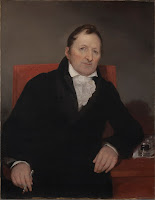Eli Whitney Jr. (December 8, 1765 – January 8, 1825) was an American inventor, widely known for inventing the cotton gin in 1793, one of the key inventions of the Industrial Revolution that shaped the economy of the Antebellum South.
Whitney's invention made upland short cotton into a profitable crop, which strengthened the economic foundation of slavery in the United States and prolonged the institution. Despite the social and economic impact of his invention, Whitney lost much of his profits in legal battles over patent infringement for the cotton gin. Thereafter, he turned his attention to securing contracts with the government in the manufacture of muskets for the newly formed United States Army. He continued making arms and inventing until his death in 1825.
Whitney was born in Westborough, Massachusetts, on December 8, 1765, the eldest child of Eli Whitney Sr., a prosperous farmer, and his wife Elizabeth Fay, also of Westborough.
The younger Eli was famous during his lifetime and after his death by the name "Eli Whitney", though he was technically Eli Whitney Jr. His son, born in 1820, also named Eli, was known during his lifetime and afterward by the name "Eli Whitney Jr."
Whitney's mother, Elizabeth Fay, died in 1777, when he was 11. At age 14 he operated a profitable nail manufacturing operation in his father's workshop during the Revolutionary War.
Because his stepmother opposed his wish to attend college, Whitney worked as a farm laborer and school teacher to save money. He prepared for Yale at Leicester Academy (now Becker College) and under the tutelage of Rev. Elizur Goodrich of Durham, Connecticut, he entered in the fall of 1789 and graduated Phi Beta Kappa in 1792. Whitney expected to study law but, finding himself short of funds, accepted an offer to go to South Carolina as a private tutor.
Instead of reaching his destination, he was convinced to visit Georgia. In the closing years of the 18th century, Georgia was a magnet for New Englanders seeking their fortunes (its Revolutionary-era governor had been Lyman Hall, a migrant from Connecticut). When he initially sailed for South Carolina, among his shipmates were the widow (Catherine Littlefield Greene) and family of the Revolutionary hero Gen. Nathanael Greene of Rhode Island. Mrs. Greene invited Whitney to visit her Georgia plantation, Mulberry Grove. Her plantation manager and husband-to-be was Phineas Miller, another Connecticut migrant and Yale graduate (class of 1785), who would become Whitney's business partner.
Whitney is most famous for two innovations which came to have significant impacts on the United States in the mid-19th century: the cotton gin (1793) and his advocacy of interchangeable parts. In the South, the cotton gin revolutionized the way cotton was harvested and reinvigorated slavery. Conversely, in the North the adoption of interchangeable parts revolutionized the manufacturing industry, contributing greatly to the U.S. victory in the Civil War.
Despite his humble origins, Whitney was keenly aware of the value of social and political connections. In building his arms business, he took full advantage of the access that his status as a Yale alumnus gave him to other well-placed graduates, such as Oliver Wolcott Jr., Secretary of the Treasury (class of 1778), and James Hillhouse, a New Haven developer and political leader.
His 1817 marriage to Henrietta Edwards, granddaughter of the famed evangelist Jonathan Edwards, daughter of Pierpont Edwards, head of the Democratic Party in Connecticut, and first cousin of Yale's president, Timothy Dwight, the state's leading Federalist, further tied him to Connecticut's ruling elite. In a business dependent on government contracts, such connections were essential to success.
Whitney died of prostate cancer on January 8, 1825, in New Haven, Connecticut, just a month after his 59th birthday. Wikipedia





No comments:
Post a Comment